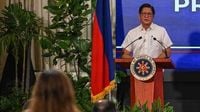Philippine President Ferdinand Marcos Jr. has found himself at the center of escalating tensions in the Asia-Pacific after bluntly stating his country would be drawn “kicking and screaming” into any conflict over Taiwan. The comments, made during a press conference at Malacañang Palace in Manila on August 11, 2025, have triggered a strong response from Beijing and underscored the complex web of security, economic, and diplomatic interests in the region.
According to Reuters, Marcos clarified that his remarks were not a provocation but a statement of fact, given the Philippines’ proximity to Taiwan and the presence of a large Filipino community on the self-ruled island. “War over Taiwan will drag the Philippines kicking and screaming into the conflict. That is what I was trying to say,” Marcos said, adding that he was perplexed by China’s accusation that he was “playing with fire.”
China, which claims Taiwan as its own territory and has repeatedly threatened to annex it by force if necessary, responded with a stern protest. The Chinese Foreign Ministry, as reported by the Associated Press, asserted that “'geographic location' and a ‘large volume of Filipinos’ in Taiwan should not be used as pretexts to interfere in the internal and sovereign affairs of other countries.” The spokesperson urged the Philippines “to earnestly abide by the One China principle” and “refrain from playing with fire on issues bearing on China’s core interests.”
The Philippines’ dilemma is not merely rhetorical. With about 200,000 Filipinos living and working in Taiwan, according to government data cited by Reuters, any military escalation would directly imperil their safety. Marcos acknowledged this reality, stating that if a conflict were to arise, “Filipinos working and living in Taiwan will have to be evacuated,” but he emphasized, “we do not want to go to war.”
Meanwhile, the situation in the South China Sea—already a longstanding flashpoint—intensified on the same day as Marcos’s remarks. The Philippine Coast Guard reported that Chinese coast guard vessels staged dangerous blocking maneuvers and used a powerful water cannon in an attempt to drive away Philippine ships from the hotly contested Scarborough Shoal. Commodore Jay Tarriela, speaking to AP, described how a Philippine vessel delivering provisions to Filipino fishermen narrowly evaded being hit by the water cannon. In a twist, a Chinese coast guard ship accidentally collided with a Chinese navy vessel during the melee, sustaining what Tarriela called “substantial damage.” The Philippine side even offered medical assistance to the Chinese crew—a rare gesture amid rising animosity.
China’s coast guard, for its part, described its actions as “professional, standardised, legitimate and legal,” insisting that it was expelling Philippine vessels from what it considers its own territory. Yet, a 2016 international arbitral tribunal ruling voided Beijing’s sweeping claims in the South China Sea, stating they had no basis under international law—a decision China has rejected outright.
The Scarborough Shoal episode is only the latest in a series of maritime run-ins between the two countries, highlighting just how fraught the waters have become. The shoal, a rich fishing atoll off the northwestern Philippines, is claimed not only by China and the Philippines but also by Taiwan, Vietnam, Malaysia, and Brunei. The area is vital both for its resources and as a key global trade route.
President Marcos has not shied away from confronting Beijing’s assertiveness since taking office in mid-2022. According to AP, his administration has deepened treaty alliances with the United States and broadened security ties with Japan, Australia, India, and several European Union member states. The goal: to strengthen deterrence against what Manila views as increasing aggression from China. “We will continue to be present, we will continue to defend our territory, we will continue to exercise our sovereign rights and despite any opposition from anyone, we will continue to do that as we have done in the past three years,” Marcos declared.
Philippine military officials have echoed these concerns. On August 11, 2025, General Romeo Brawner, the country’s military chief, warned that the Philippines would “inevitably” be involved if Taiwan were invaded. He also accused China of attempting to infiltrate the Filipino military and other national institutions, a claim that further complicates already tense relations.
These developments have not gone unnoticed by the international community. The United States, bound by a mutual defense treaty with the Philippines, has repeatedly affirmed its commitment to defend its ally in the event of an armed attack. Meanwhile, other countries in the region are watching closely, aware that the outcome of these disputes could reshape the balance of power in Asia.
For ordinary Filipinos, the stakes are personal as well as political. The large Filipino diaspora in Taiwan faces uncertainty and potential danger if hostilities were to break out. Marcos has pledged that his government is making contingency plans for their evacuation, should the need arise. “I hope it doesn’t happen, but, if it does, we have to plan for it already,” he said, reflecting both the gravity and the unpredictability of the situation.
China’s suspicion of Manila’s intentions appears to be rooted in a broader strategic rivalry. As reported by Reuters, Beijing accused Marcos of interfering in its domestic affairs and violating its “One China” policy after his comments in India about the inevitability of Philippine involvement in a Taiwan conflict. Marcos, however, insisted that his statements were “misinterpreted” for propaganda purposes and reiterated his desire to avoid confrontation.
The pattern of maritime confrontations in the South China Sea shows little sign of abating. The Philippine government recently accused the Chinese coast guard of firing flares at one of its aircraft during patrols, and such incidents have become almost routine. Each encounter adds another layer of risk to an already volatile environment.
Despite the mounting pressure, Marcos remains adamant that the Philippines will not back down from defending its territorial interests. “There is no silver bullet that if you fire it, all our problems would be solved,” he remarked. The message is clear: Manila intends to stand its ground, even as it seeks to avoid being drawn into a larger conflagration.
With the South China Sea disputes and the specter of conflict over Taiwan looming ever larger, the Philippines finds itself at a crossroads. The choices made in Manila—and in Beijing, Washington, and Taipei—over the coming months may well determine the region’s trajectory for years to come.






